SPEAKERS: Dr. Tony Shelton, Professor, Entomology
Brian Caldwell, Field Manager, Cornell’s Organic Cropping Systems Project
DATE: Wednesday, March 17
TIME: 12:20 – 1:10 p.m.
PLACE: 135 Emerson Hall
Refreshments provided.
Genetic engineering of crops is being done at present primarily for pest management, but there are different views on its effectiveness and place in agriculture. Brian Caldwell will show how genetic modification of crops creates genetic pollution and how their commercialization and infrastructure worsen, rather than solve, food system problems. He will advocate that approaches which rely on local resources and whole farm management will be more successful. Tony Shelton suggests the foundation of Integrated Pest Management (IPM) is the use of host plant resistance (HPR), and genetic engineering (GE) expands this opportunity. He will show that the present insect-resistant GE crops control key pests while dramatically reducing the use of harmful insecticides and can be a component of whole farm management and local food systems, both in the context of domestic and international agriculture.
Tony Shelton is a Professor of Entomology and a CALS International Professor who works on developing IPM strategies for insects on vegetables and other crops. His program focuses on insect population ecology, biological control, plant resistance, agricultural biotechnology, insecticide resistance, trap cropping, and plant productivity and marketability as a function of insect infestations.
Brian Caldwell is field manager for Cornell’s Organic Cropping Systems Project. He also operates a small certified organic apple orchard. He is co-author, with Tony Shelton and others, of The Resource Guide for Organic Insect and Disease Management.
Co-sponsored by the Departments of Crop and Soil Sciences, Natural Resources, and Applied Economics and Management

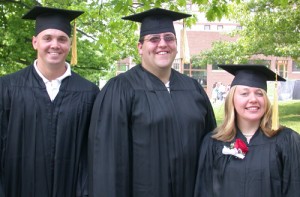
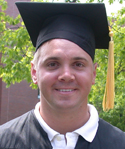 Joe Brightly transferred to Cornell as a junior, taking classes that aim to improve soil health and fertility, business management, and control of harmful insects and weeds. He returned home to work for his father on the family farm.
Joe Brightly transferred to Cornell as a junior, taking classes that aim to improve soil health and fertility, business management, and control of harmful insects and weeds. He returned home to work for his father on the family farm.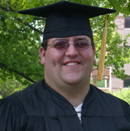 Matt Eckhardt came to Cornell as a transfer student in Fall 2007 with an Associates in Crop Production from SUNY Cobleskill. Matt grew up on his family’s 800 acre cash crop and vegetable farm in Eastern New York. During his time at Cornell, Matt continuing pursuing his interest in crop consulting and crop advisor certification. After graduation he will continue working with the farm and crop consulting.
Matt Eckhardt came to Cornell as a transfer student in Fall 2007 with an Associates in Crop Production from SUNY Cobleskill. Matt grew up on his family’s 800 acre cash crop and vegetable farm in Eastern New York. During his time at Cornell, Matt continuing pursuing his interest in crop consulting and crop advisor certification. After graduation he will continue working with the farm and crop consulting.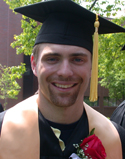 Rob Farnham always knew his passion was agriculture. He has always had the feeling that if he couldn’t be a farmer that he would devote himself to helping them. Rob started his college career at SUNY Cobleskill where he received an Associates Degree in Agricultural Business in 2006. As an Agricultural Sciences student, Rob interned with a large dairy farm in western NY and with Syngenta Seeds in Omaha Nebraska. He has now taken a full time position with Syngenta as a Seed Sales and Marketing Representative in Central Pennsylvania. Rob’s long term plans are to return to farming after gaining experience in industry.
Rob Farnham always knew his passion was agriculture. He has always had the feeling that if he couldn’t be a farmer that he would devote himself to helping them. Rob started his college career at SUNY Cobleskill where he received an Associates Degree in Agricultural Business in 2006. As an Agricultural Sciences student, Rob interned with a large dairy farm in western NY and with Syngenta Seeds in Omaha Nebraska. He has now taken a full time position with Syngenta as a Seed Sales and Marketing Representative in Central Pennsylvania. Rob’s long term plans are to return to farming after gaining experience in industry.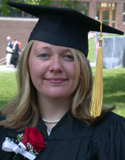 Megan Fenton did not move far from home when she came to Cornell. Megan grew up only a short distance from Ithaca in Penn Yan, New York. While at Cornell, Megan maintained involvement in Future Farmers of America and received her American degree last semester. For Megan, her time at Cornell University was a period of intellectual and personal growth in an environment where she felt lucky to have professors she truly admired. After graduation Megan plans to continue with a life in production agriculture and utilize all the knowledge she gained.
Megan Fenton did not move far from home when she came to Cornell. Megan grew up only a short distance from Ithaca in Penn Yan, New York. While at Cornell, Megan maintained involvement in Future Farmers of America and received her American degree last semester. For Megan, her time at Cornell University was a period of intellectual and personal growth in an environment where she felt lucky to have professors she truly admired. After graduation Megan plans to continue with a life in production agriculture and utilize all the knowledge she gained.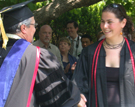 Miriam Goler is from New York City. She started her undergraduate studies in Biological and Environmental Engineering and switched into the Agricultural Sciences major her junior year. She is most proud of the semester she spent working in Mexico, where she helped start a community garden, coordinated a series of workshops on organic gardening, and helped build a rooftop vegetable garden. She also completed a research project with Quirine Ketterings on the Illinois Soil Nitrogen Test that culminated in a co-authored paper in a peer-reviewed journal. She is currently working at Cooperative Extension on issues of food access for low-income community members, and is returning to New York City to continue working on similar issues as an AmeriCorps volunteer with the non-profit Just Food.
Miriam Goler is from New York City. She started her undergraduate studies in Biological and Environmental Engineering and switched into the Agricultural Sciences major her junior year. She is most proud of the semester she spent working in Mexico, where she helped start a community garden, coordinated a series of workshops on organic gardening, and helped build a rooftop vegetable garden. She also completed a research project with Quirine Ketterings on the Illinois Soil Nitrogen Test that culminated in a co-authored paper in a peer-reviewed journal. She is currently working at Cooperative Extension on issues of food access for low-income community members, and is returning to New York City to continue working on similar issues as an AmeriCorps volunteer with the non-profit Just Food.